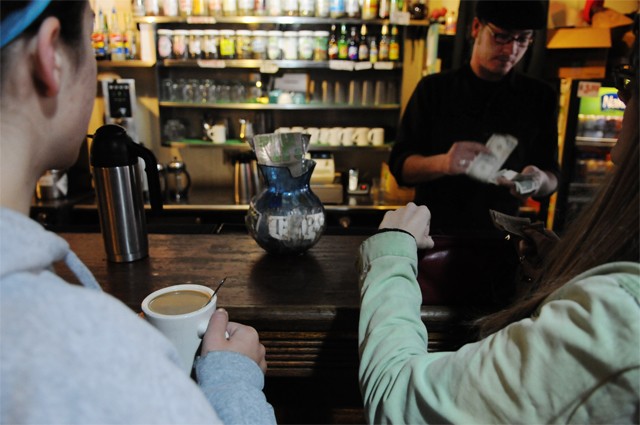The global price of coffee is the highest it has been for 12 years, according to the International Coffee Organization.
Prices have jumped from 64 cents per pound in 2000 to 89 cents in 2005 and most recently to $1.64 per pound in September, according to ICO.
For some coffee retailers, including Starbucks, the most recent increase has forced stores to increase the price of a cup of joe instead of absorbing the increased supplies cost.
“We have thus far chosen to absorb the price increases ourselves and not pass them on to our customers,” Starbucks Chairman, President and CEO Howard Schultz said in a press release Sept. 22. “But the extreme nature of the cost increases has made it untenable for us to continue to do so.”
Dana Davenport, a supervisor at the Starbucks on Washington Avenue Southeast, said the store would be changing its prices but would not specify by how much and on which drinks.
Staff at Caribou Coffee, Bordertown Coffee, Dunn Bros Coffee and Hard Times Café have said their campus shops will not be increasing their prices at this time.
Part of the reason for the decadeâÄôs drastic increase can be attributed to the large fall in prices during the early 2000s, according to the Food and Agriculture Organization of the United Nations.
During this time there was an oversupply of coffee while the demand remained stagnant, leading to the lowest price levels in more than three decades.
Steve Suppan, a senior policy analyst at the Institute for Agriculture and Trade Policy, explained three possible reasons for coffeeâÄôs price to have increased since then.
First, financial investors could be driving the market through bundled commodity indexes. From 2006 to 2008, Suppan estimated that roughly a fifth of all coffee contracts were influenced by funds jumping in and out of the market through speculation, likely leading to its price instability.
Second, Suppan said there has been a spike in the futures market that has allowed larger firms like Starbucks to offer better prices to farmers than fair traders could, which can drive up the market price.
“Under normal economic circumstances, fair trade can offer very attractive prices to farmers that in many years will be above the futures market price,” Suppan said. “But when the futures market becomes very volatile, as it has been for the last few years, then the fair trade prices fall below the futures market price.”
Because coffee farmers need a predictable income to maintain their crops, they will choose the contracts with larger firms, Suppan said.
A third reason for the price increase could also simply be the competition between the cheaper Robusta coffee beans and the more expensive Arabica beans, Suppan said.
While most coffee shops on campus said they havenâÄôt felt the recent jump in prices, they most likely will once their suppliers need new contracts with farmers.
Bordertown Coffee manager Stephen Miller said its distributor was great at keeping prices low, through he knows prices have been creeping upward every year.
“We havenâÄôt felt anything so significant that itâÄôs been really noticeable,” Miller said. “We generally have to do a minor price increase every other year âĦ But we feel like we hit a certain wall where we go, âÄòwe just canâÄôt charge more for that.âÄô “
Jason Buckendorf, a worker at the employee-owned Hard Times Café on Riverside Avenue, said his restaurant hadnâÄôt felt the coffee bean prices increase either, but wouldnâÄôt increase their in-store prices even if they had.
“Coffee is one of the few things affordable in this neighborhood,” Buckendorf said. “We want to be able to have cheap coffee so people can come and enjoy it. I just like the idea of having a place that people can come hang out for a dollar.”
Lee Wallace, who runs fair-trade coffee distributor Peace Coffee, said she believed the price increase is good because it means thereâÄôs a greater chance farmers are getting more money.
“If weâÄôre all paying the highest prices weâÄôve paid in 13 years for coffee, thatâÄôs great,” Wallace said. “What I would urge is that coffee companies then continue to pay those prices to farmersâÄô families even if the market goes back down.”
“We have a responsibility to tell people about the fact coffee farmers still arenâÄôt getting enough money,” Wallace added.

















